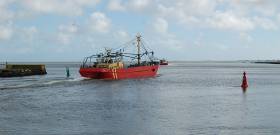Displaying items by tag: fishing boats
Seabirds are targeting fishing boats far more often for food, a new international study involving University College Cork (UCC) scientists has found.
UCC scientists worked with colleagues from Norway, Scotland and Iceland to track over 250 northern fulmars from across the North Atlantic over the last 16 years.
The team involved in the SEATRACK programme, as it is called, published their findings in Current Biology.
Lead author Jamie Darby of UCC’s MaREI centre, said the team used tiny 2.5g loggers mounted on the birds’ legs to record light, including artificial lights at night.
“Because fulmars can feed at any time, day or night, light signals recorded at night can reliably be attributed to fishing boats, particularly in heavily fished areas,” Darby explained.
"We looked at the prevalence of light recordings at night to determine how frequently seabirds were encountering vessels and how that changed over time,” he said.
They discovered that fulmars breeding across the wider North Atlantic area are increasingly encountering fishing boats, despite fishing fleet sizes decreasing over the same time period.
This suggests that encounters are not driven by increased numbers of vessels, but by birds targeting boats more often, the scientists concluded.
Previous research had shown that other seabird species have tended to switch to scavenging around vessels for catch or bait or both when their own food sources are depleted.
Mark Jessopp, also of UCC and co-author of the paper, said that “one possibility is that finding their usual food has become more difficult due to overfishing or habitat degradation”.
"Fulmars that didn’t frequently follow vessels actually migrated further and spent more time looking for food than those that relied more heavily on vessels, highlighting the advantage of following vessels to obtain predictable food,”he said.
The scientists noted that the “downside” of such behaviour is that the seabirds are increasingly becoming “bycatch”, due to being accidentally caught or entangled in fishing gears.
Bycatch is one of the main impacts on seabird populations, many of which are globally threatened, the scientists have said.
“This study provides further motivation to solve the bycatch issue and make fishing gears safer for marine life,”Darby said.
The full paper, entitled “Decadal increase in vessel interactions by a scavenging pelagic seabird across the North Atlantic”, can be found here.
A Question for The Marine Minister
“The question which must be answered by the Minister is – Does his Department genuinely not think that fish are a natural resource?
“If the answer is ‘no’ – then who, in his name (and all of us), said that they were not?”
That question, from a solicitor very experienced in fisheries matters, deserves an answer.
But will it be answered by the Minister for the Marine?
What do you think …. I am not particularly hopeful, but it is at the kernel of a major issue at the moment and also highlights the lack of national media coverage of maritime affairs and fisheries in particular…. Which mostly attract attention in times of tragedy, crisis or controversy.
Did you see much coverage, for example, that Northern Ireland fishing boats have been told they are no longer permitted within the six-mile Republic limit…. And that there could be consequent effects within the 12-mile limit …. Or that a bill for up to €200m could face the State, for which read us taxpayers, for what was done back in 1965 by an exchange of letters, described as a “gentlemen’s agreement,” between, it seems, civil servants on behalf of their Minister, which created what was called the VOISINAGE agreement or arrangement.
It’s all to do with mussel seed and a case taken by four fishermen against the State where, after years of legal activity, the Supreme Court ruled that the Government was not right in giving away a natural resource of the State without the approval of the Oireachtas…
Dermot Conway of Conway Solicitors in Cork has dealt with many fisheries cases….including a successful challenge against the issue of Penalty Points…
The question he has raised about whether fish is seen by the Department of the Marine as a natural resource is at the core of the attitude of Department officials towards the industry, it seems to me…… “Incredibly,” Dermot Conway says, Department officials argued in Court that mussel seed in Irish waters was “not a natural resource…”
So, let’s have an answer to the question….
I did ask the Department of the Marine who actually signed the VOISINAGE agreement letter on behalf of this Republic…. They wouldn’t tell me….





























































